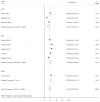Prevalence and Risk Factors for Antenatal Depression in Ethiopia: Systematic Review
- PMID: 30112199
- PMCID: PMC6077581
- DOI: 10.1155/2018/3649269
Prevalence and Risk Factors for Antenatal Depression in Ethiopia: Systematic Review
Abstract
Introduction: Antenatal depression is a syndrome, in which women experience depressed mood, excessive anxiety, insomnia, and change in weight during the period of pregnancy. Maternal depression negatively influences child outcomes and maternal health. Antenatal depression was measured by different rating scales, namely, BDI, EPDS, and PHQ. The objective of this systematic review was to synthesize logical evidence about the prevalence and potential risk factors of antenatal depression in Ethiopia.
Methods: Our team explored multiple databases including PSYCHINFO, MEDLINE, Embase, Google Scholar, and Google Search to detect studies published with data on the prevalence of antenatal depression. We found 246 research papers on antenatal depression, of which 210 did not correspond to the title and 27 were duplicates. Subsequently, nine articles were used for synthesis prevalence, of which four studies were selected in the analysis of the effect of unplanned pregnancy on antenatal depression. Figures were extracted from published reports and grey literature, and any lost information was requested from investigators. Estimates were pooled using random-effects meta-analyses.
Results: The pooled prevalence of antenatal depression for five studies selected, which had used BDI, was 25.33 (20.74, 29.92). The other four studies that had included other screening tools (3 EPDS and 1 PHQ) had the prevalence decreased to 23.56 (19.04, 28.07), and the pooled effect of unplanned pregnancy on antenatal depression was 1.93 (1.81, 2.06). Factors such as age, marital status, income, occupation, history of the previous mental disorder, antenatal follow-up, unplanned pregnancy, complication during to pregnancy, age of mother during pregnancy, conflict, and social support were associated with antenatal depression.
Conclusions: Antenatal depression is a common maternal problem; further attention should be given to the effect of unplanned pregnancy, social support, pregnancy-related complications, family conflicts, and violence on pregnant women. All these are possible risk factors for antenatal depression.
Figures
Similar articles
-
Prevalence and determinants of antenatal depression among pregnant women in Ethiopia: a systematic review and meta-analysis.BMC Pregnancy Childbirth. 2018 Nov 29;18(1):462. doi: 10.1186/s12884-018-2101-x. BMC Pregnancy Childbirth. 2018. PMID: 30486804 Free PMC article.
-
Prevalence and determinants of antenatal depression in Ethiopia: A systematic review and meta-analysis.PLoS One. 2019 Feb 19;14(2):e0211764. doi: 10.1371/journal.pone.0211764. eCollection 2019. PLoS One. 2019. PMID: 30779765 Free PMC article.
-
Antenatal depression among pregnant women in Ethiopia: An umbrella review.PLoS One. 2025 Jan 21;20(1):e0315994. doi: 10.1371/journal.pone.0315994. eCollection 2025. PLoS One. 2025. PMID: 39836614 Free PMC article.
-
Prevalence of antenatal depression and associated factors among pregnant women in Addis Ababa, Ethiopia: a cross-sectional study.Reprod Health. 2015 Oct 30;12:99. doi: 10.1186/s12978-015-0092-x. Reprod Health. 2015. PMID: 26514827 Free PMC article.
-
Social determinants of antenatal depression and anxiety among women in South Asia: A systematic review & meta-analysis.PLoS One. 2022 Feb 9;17(2):e0263760. doi: 10.1371/journal.pone.0263760. eCollection 2022. PLoS One. 2022. PMID: 35139136 Free PMC article.
Cited by
-
Psychometric Evaluation of the Persian Version of the Childbirth Experience Questionnaire (CEQ).Biomed Res Int. 2020 Dec 10;2020:6879283. doi: 10.1155/2020/6879283. eCollection 2020. Biomed Res Int. 2020. PMID: 33376731 Free PMC article.
-
Intention to use a mobile phone to receive mental health support and its predicting factors among women attending antenatal care at public health facilities in Ambo town, West Shoa zone, Ethiopia 2022.BMC Health Serv Res. 2023 Dec 6;23(1):1368. doi: 10.1186/s12913-023-10392-z. BMC Health Serv Res. 2023. PMID: 38057856 Free PMC article.
-
Depression and anxiety among pregnant women living with HIV in Kilimanjaro region, Tanzania.PLoS One. 2019 Oct 31;14(10):e0224515. doi: 10.1371/journal.pone.0224515. eCollection 2019. PLoS One. 2019. PMID: 31671160 Free PMC article.
-
Trend of Antenatal Depression and Its Risk Factors Among Pregnant Women in China From 2016 to 2021: A Repeated Cross-Sectional Study Under Multiple Fertility Policy Adjustments and Economic Development.Depress Anxiety. 2025 Apr 15;2025:6823160. doi: 10.1155/da/6823160. eCollection 2025. Depress Anxiety. 2025. PMID: 40264858 Free PMC article.
-
Depression and quality of life among pregnant women in first and third trimesters in Abeokuta: A comparative study.S Afr J Psychiatr. 2022 Mar 31;28:1779. doi: 10.4102/sajpsychiatry.v28i0.1779. eCollection 2022. S Afr J Psychiatr. 2022. PMID: 35402012 Free PMC article.
References
-
- World Health Organization. The World Health Report 2001: Mental health: new understanding, new hope. World Health Organization; 2001.
-
- Depression W. A global Crisis. World Mental Health Day, 2012
-
- FMOH. National Mental Health Strategy of Ethiopia :(2012/13 -2015/16) Addis Ababa, 2012.
-
- World Health Organization. Mental health aspects of women's reproductive health: a global review of the literature. World Health Organization; 2009.
Publication types
LinkOut - more resources
Full Text Sources
Other Literature Sources




